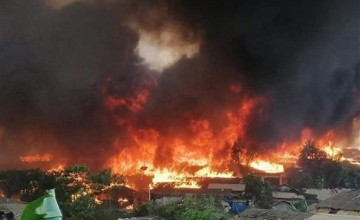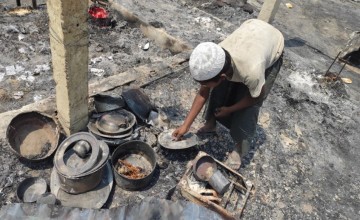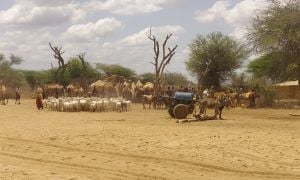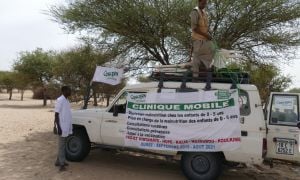
Read our 2023 annual report

Knowledge Hub
Rohingya Fire Emergency Response 2021
The fire
On 22 March 2021, a devastating fire broke out in the Kutupalong Balukhali Extension, a refugee camp hosting Rohingya refugees in Cox's Bazar, Bangladesh. The fire caused significant damage to several camps within the site and also damaged a reported 200 structures in the host community.
The damage caused by the fire significantly set back the humanitarian response and exacerbated the existing needs of the Rohingya, who were already living in precarious conditions. It is estimated that out of the 124,381 people living in the camps affected by the fire, 88,000 were affected with 48,300 being displaced. The people affected by the fire lost their homes and belongings and families whose shelters were not directly damaged or destroyed by the fires were still affected by the damage the fire caused to latrines, water pumps, health facilities, learning centres, markets and distribution sites.

Concern's response
Concern Worldwide has been working in Bangladesh since 1972 and has worked in Cox’s Bazar intermittently over the years. Since September 2017, Concern has scaled up its operation in Cox’s Bazar to address the humanitarian needs of the Rohingya people living in refugee camps. In 2020, Concern began responding to the Covid-19 crisis working to improve the resilience of vulnerable households and improve COVID-19 infection prevention and control at health facilities and at community level in the Rohingya refugee camps in Cox’s Bazar.
Concern implements its integrated nutrition project directly and in 2020 started a three years project funded by The Bureau of Population, Refugees, and Migration (PRM), which is the humanitarian bureau of the U.S. Department of State, working directly through a national partner Social Assistance and Rehabilitation for the Physically Vulnerable (SARPV). It was this partnership that prompted Concern to engage jointly with SARPV in the fire response. SARPV is the nutrition partner in camp 8W – one of the four fire affected camps, and together in a joint task force, Concern and SARPV responded to support the fire-affected survivors in 8W.
Concern’s overall objective of the response was to ensure that immediate food security needs for the 13,500 individuals affected by the March 2021 fires in camp 8W were met. This was achieved through the following:
Outcome 1: Immediate to short term food and nutrition services are provided to fire-affected people in camp 8W
- Output 1.1: Targeted households meet their immediate short term food needs
- Output 1.2: Targeted households have utensils to prepare meals at home.
Outcome 2: Provision of psychosocial support and complaints response mechanism to fire-affected people in camp 8W
- Output 2.1: Number of individuals who reached with psychosocial support
- Output 2.2: Complaints and Response Mechanism established and functional
Concern worked with SARPV to establish a response task force and commenced response activities from 22 March to April 13, 2021.
Key activities
Along with the Rohingya community in the camps, part of a neighbouring host area was also affected by the fire. Concern and SARPV supported both the refugee and host communities in the response to the fire.
- Distribution of dry food and water to 13,920 affected people in camp 8W
- Through joint activities with IRC under the PRM project, provided psychosocial support in camp 8W through field teams and protection volunteers
- Distribution of household non-food items (NFIs) - 2,499 refugee households and 140 affected host community households received home cooking sets
- Established hot kitchens with World Food Programme (WFP) to provide at least 10,000 hot meals a day (lunch and dinner)
- Concern and SARPV nutrition staff screened 1,009 malnourished children and referred them for treatment
- Procured clothing and dignity kits (including underwear and sanitary pads) for 6,733 women and girls in camp 8W

Evaluation findings
The evaluation used the Organisation for Economic Co-operation and Development–Development Assistance Committee (OECD-DAC) Principles for evaluating humanitarian assistance to provide a structure to the findings. These criteria were Relevance/ Appropriateness, Connectedness, Coherence, Coverage, Efficiency, Effectiveness and timelines, and Impact. The cross cutting themes of Equality, Protection, Disaster Risk Reduction, Partnership and Environmental Impacts were also evaluated. Each criteria was scored on a scale from 0 - 4 as below:
- 4 - Outstanding performance
- 3 - Performance in line with what would be expected of a well-functioning organisation
- 2 - Generally acceptable performance but with some clear, and documented, shortcomings
- 1 - Barely acceptable performance with some major shortcomings and reservations
- 0 - Totally unacceptable performance or insufficient data to make an assesssment
The evaluation scored the response as follows:
- Relevance/ Appropriateness - 4
- Connectedness - 4
- Coherence - 3
- Coverage - 4
- Efficiency - 4
- Effectiveness and Timelines - 4
- Impact - 4
- Equality - 3
- Protection - 3
- Disaster Risk Reduction - 3
- Partnership - 4
- Environmental impacts - 2
The response was immediate within 24 hours of the fire. The evaluation found that "The project succeeded in achieving its targets and the subsequent immediate impact was the fire affected families were supported with nutrition interventions that prevented a deterioration in nutrition status."
Download the Executive Summary
This publication covers aid activities implemented with the financial assistance of several donors, including UN agencies (WFP), Irish Aid, Concern Worldwide CEO Fund and Concern US. The ideas, opinions and comments herein are entirely the responsibility of the author(s) and do not necessarily represent or reflect the policies of any donors.




